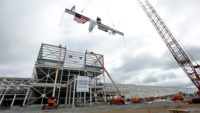The U.S. Dept. of Energy will sharply increase money available for state clean-energy infrastructure and systems projects, announcing $425 million in added funding available through the agency's State Energy Program that now is provided by the federal Infrastructure Investment and Jobs Act.
In a call with reporters Aug. 26, Mitch Landrieu, White House senior advisor and infrastructure implementation coordinator, said the funding also supports related demonstration projects, energy workforce development and energy efficiency upgrades.
The new funding adds to $56.5 million already allocated to the program for 2022, and similar or lower amounts in previous years. Landrieu said applications are now open for states and territories seeking the funds.
“We put this funding to work in ways where we’re going to be able to build up our energy security, cut energy costs and increase affordability, reduce carbon emissions and create economic opportunity,” he said.
Landrieu pointed to a project to build solar canopies and install electric vehicle charging stations in the parking lot outside a Baltimore IKEA store and a Kentucky program to help transform former mine property into solar developments as examples projects that State Energy Program money can fund.
DOE officials will offer technical assistance to states to help facilitate projects funded by the program, particularly in areas that the Biden administration has prioritized—including transmission and distribution, energy security, community energy planning, clean-energy manufacturing and system-wide planning for grid expansion, modernization and clean energy technology integration.
The money will be distributed to states via a formula funding method, so there will be no competition, but states and territories must still apply for the money, explaining how their plans fit with the program’s goals, said Jeremiah Baumann, chief of staff for DOE's undersecretary for infrastructure.
“These funds are quite flexible,”he said. “They really do give states and territories the freedom to develop the kinds of clean energy programs and projects that are going to be right for every community in their state," including upgrades of home and commercial building energy efficiency, launching clean energy demonstration projects or investment in manufacturing facilities to expand the domestic clean energy supply chain.





